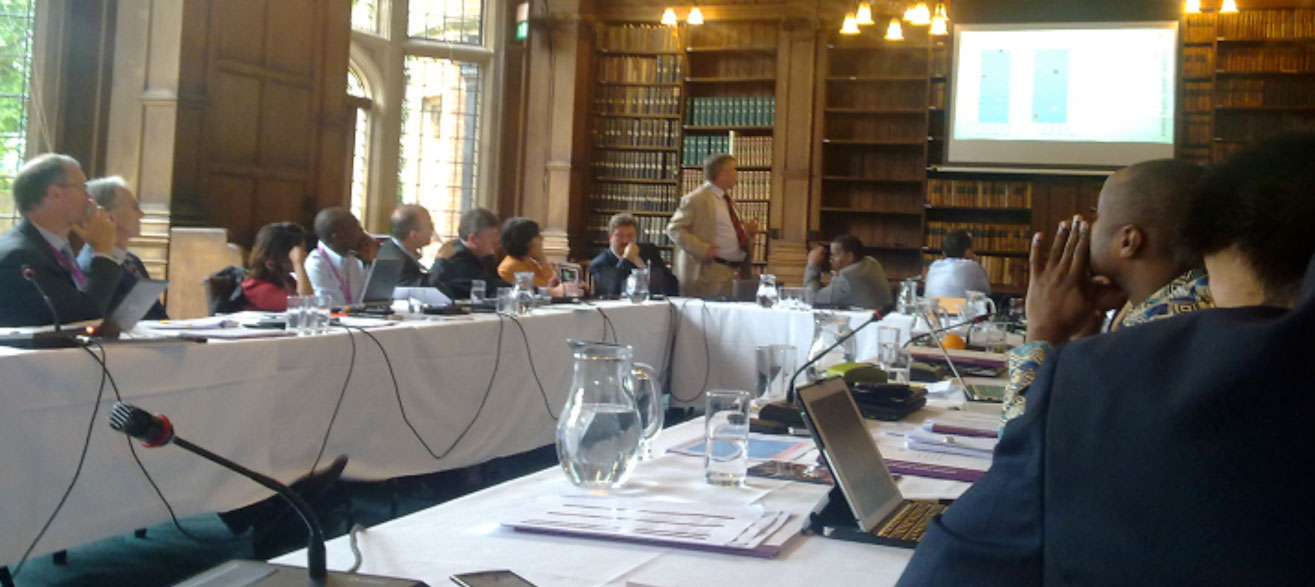Project : Facilitation of legal advice to UNFCCC developing country negotiators
Project : Facilitation of legal advice to UNFCCC developing country negotiators
This project was extended to 04/11/14 under the code ADGL-0004c.
Project ADGL0004 aimed to provide legal support to Least Developed Countries (LDCs) and non-governmental organizations (NGOs) serving LDCs during the United Nations Framework Convention on Climate Change (UNFCCC) process. It also aimed to build the capacity and understanding of LDC decision maker. The Legal Response Initiative (LRI) was set up in 2009 to facilitate the provision of pro bono legal advice on climate change to developing countries and non-governmental organisations. Through training, briefing papers, legal opinions and hands-on, real time assistance, LRI sought to reduce the disparity between stakeholders in the climate negotiations. CDKN provided LRI with support, enabling them to continue and scale up their legal support to LDC negotiators and enhance the function of their network of pro bono advisers.
During UNFCCC negotiation sessions, LRI provides legal advice and written responses to queries from LDC and developing country delegations. Liaison officers present at the negotiations provide real time legal advice to delegates, and for more complex questions, help delegates to formulate legal questions to be passed to the LRI 'situation room' in London. From here, requests are distributed to the LRI network of advisers for a response. At present, LRI has access to about 150 pro bono advisers from different jurisdictions. They are based in law firms, barrister chambers and universities with expertise in areas such as public international law, human rights, trade, carbon market regulations, finance or intellectual property.
In addition to the provision of rapid response advice, LRI expanded its capacity building work through a partnership with European Capacity Building Initiative (ECBJ) and has also developed legal training for lawyers from LDCs.
Key outcomes from this project include:
- Increasing the understanding and awareness of LDC negotiators of key legal issues in the UNFCCC negotiations.
- Increasing the ability and capacity of LDC negotiators to influence the negotiations by providing access to high quality legal advisory services and through capacity building on legal issues.
For further insight into the work of LRI, watch the videos below.
Hear the perspectives of Ibila Djibril, a climate change negotiator from Benin and Alpha Kaloga a negotiator from Guinea on the work of the LRI.
Kate Cook is a Barrister at Matrix Chambers where she practises public international law and regularly advises on environmental law and WTO issues. Here she talks about the work of an LRI adviser.
Latest update:
June 2012: LRI joined the ECBI as a lead organisation. ECBI promotes a level playing field between government delegations to the international climate negotiations, and seeks to strengthen relations between European and developing country negotiators. LRI’s legal skills and networks helped to develop ECBI’s outputs and supplement the design and delivery of capacity building programmes.
So during the ECBI fellowship colloquium in Oxford from 9 to 13 July, LRI provided legal training and advice to the participants. This included a presentation on loss and damage on the first day of the meeting and ad hoc legal input on days two and four.
(ECBI meeting of climate negotiators from European and developing countries on 12 July).
LRI was also preparing for the next round of climate negotiations in Bangkok from 30 August to 5 September 2012. It sent a team of four to talk delegates through legal issues and forward substantive legal queries to its network of advisers.
September 2012: to prepare the next major climate conference at the end of the year in Doha, Qatar, the parties to the United Nations Framework Convention on Climate Change (UNFCCC) have been meeting in Bangkok from 30 August to 5 September.
The limited number of participants and the informal nature of the meeting provided ample opportunity for the Legal Response Initiative (LRI) to strengthen their relationships with different actors. LRI met with, for example, the (current and next) chairs of the Least Developed Countries (LDC) and the African Group.
Their delegations face some of the hardest challenges in the UNFCCC process. They represent countries and societies that are most vulnerable to the impacts of climate change but tend to be seriously outnumbered by much larger delegations from the North. LRI therefore provides them with legal advice and assistance on a pro bono basis.
In Doha, parties had to address provisional application of the Kyoto Protocol, the work of the AWG-LCA, the interpretation of common but differentiated responsibilities and several other issues with significant legal dimensions. This was reflected in the number of legal queries – over 20 – received by the four LRI lawyers who attended the meeting in Bangkok. More than half of the queries came from delegates representing developing countries; the other half from non-governmental organisations (NGOs).
But progress in the negotiations remains slow, and policy makers and lawyers increasingly contemplate the use of other avenues to promote environmental justice and develop political pressure on the UNFCCC process.
In the UN General Assembly, Palau announced that, in collaboration with other countries, it will be seeking an advisory opinion from the International Court of Justice (ICJ) on climate change damage. To date, the ICJ has delivered over 20 advisory opinions that carry significant legal weight and can provide some guidance for the international community.
In July, LRI published two legal briefing papers on the Palau initiative. They are available at: http://legalresponseinitiative.org/briefing.htm
This project has also been extended under the following project codes: ADGL-0052 and BEIS-0001.
Contract value for the period November 2013 – November 2014: £148,958.

